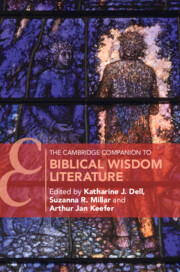Book contents
- The Cambridge Companion to Biblical Wisdom Literature
- Cambridge Companions to Religion
- The Cambridge Companion to Biblical Wisdom Literature
- Copyright page
- Contents
- Contributors
- Acknowledgement
- Abbreviations
- Part I The Context of Wisdom Literature
- Part II Wisdom Literature in the Hebrew Bible
- 8 Proverbs
- 9 Job
- 10 Ecclesiastes
- 11 The Song of Songs
- 12 Wisdom Psalms
- 13 Wisdom’s Wider Resonance
- Part III Wisdom Literature beyond the Hebrew Bible
- Part IV Themes in the Wisdom Literature
- Bibliography
- Index
- Cambridge Companions to Religion
- References
10 - Ecclesiastes
from Part II - Wisdom Literature in the Hebrew Bible
Published online by Cambridge University Press: 28 July 2022
- The Cambridge Companion to Biblical Wisdom Literature
- Cambridge Companions to Religion
- The Cambridge Companion to Biblical Wisdom Literature
- Copyright page
- Contents
- Contributors
- Acknowledgement
- Abbreviations
- Part I The Context of Wisdom Literature
- Part II Wisdom Literature in the Hebrew Bible
- 8 Proverbs
- 9 Job
- 10 Ecclesiastes
- 11 The Song of Songs
- 12 Wisdom Psalms
- 13 Wisdom’s Wider Resonance
- Part III Wisdom Literature beyond the Hebrew Bible
- Part IV Themes in the Wisdom Literature
- Bibliography
- Index
- Cambridge Companions to Religion
- References
Summary
Mette Bundvad considers Ecclesiastes as a book of contradictions and one that has a peculiar narrator and special thematic concerns. Instead of giving a catalogue of possible or plausible contradictions in the book, Bundvad surveys the ways in which scholars have reckoned with the book’s evident tensions. The question that emerges, then, is whether these contradictions are a feature of the book or a ‘bug’ of sorts. Ecclesiastes’ portrayal of its narrator falls under the rubric of these very tensions, exhibiting a man, or men, who wears various guises and no one persona. Bundvad concludes with reflections about the book’s treatment of time, a theme that does not resolve every tension but does open up new questions and possible structures.
- Type
- Chapter
- Information
- The Cambridge Companion to Biblical Wisdom Literature , pp. 184 - 199Publisher: Cambridge University PressPrint publication year: 2022

